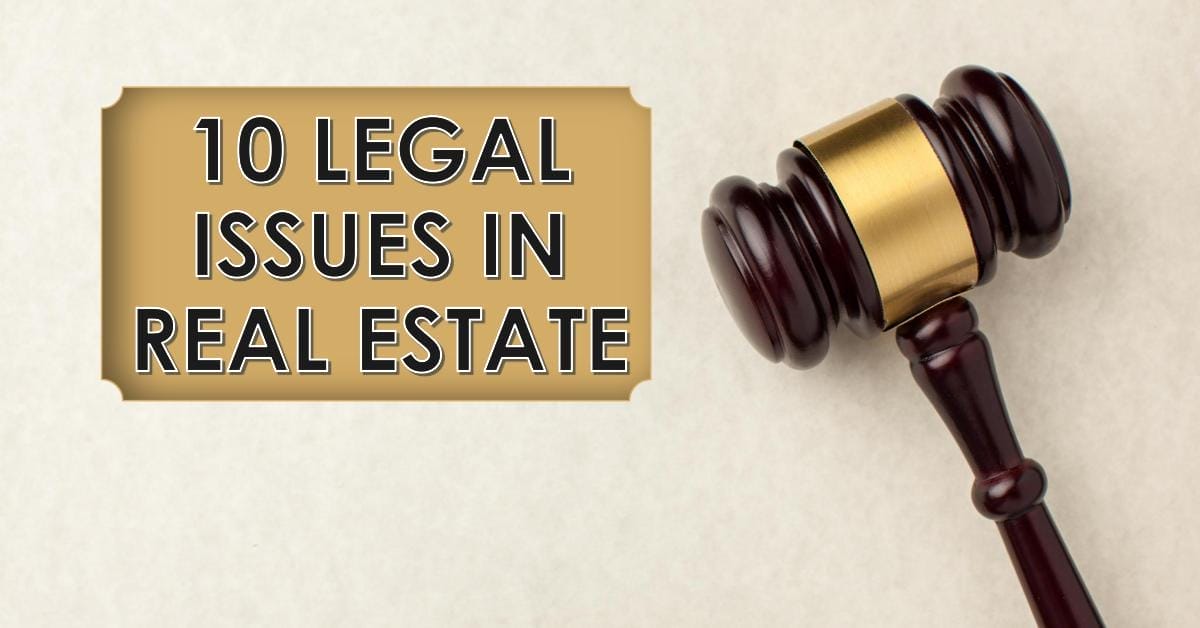Top 10 Legal Issues in Real Estate You Should Be Aware Of
Understanding the top 10 legal issues in real estate is essential for navigating property transactions. Zoning and land use regulations dictate property use and value. Property disputes may arise from boundary discrepancies or adverse possession claims. Contract issues, such as breaches and misrepresentations, can lead to legal conflicts. Title concerns, environmental regulations, and financing challenges are key factors affecting property transactions. Construction defects, homeowner association disputes, and fair housing laws compliance also play significant roles. Each issue requires careful consideration to safeguard investments and guarantee legal compliance.
Zoning and Land Use Regulations
In the domain of real estate, the intricate framework of zoning and land use regulations plays a pivotal role in shaping the permissible activities and structures within a given geographical area. Zoning regulations control land use by defining what can be built where based on factors like property size, location, and intended use. However, there are instances where property owners may seek zoning variances to deviate from these rules. Variance requests require approval from local authorities and may involve public hearings to make sure that any exceptions align with the overall community interest.
Moreover, land development restrictions imposed by zoning and real estate laws are important to maintain the integrity of neighborhoods, protect property values, and regulate the aesthetics of an area. Understanding these regulations is essential for real estate investors and developers to avoid costly fines, project delays, or even forced property changes. Changes in zoning regulations can have a significant impact on property value and development potential, making it essential for stakeholders to stay informed and adapt their strategies accordingly to navigate the dynamic landscape of real estate investments effectively.
Property Disputes
Property disputes, inherent to the arena of real estate, encompass a variety of conflicts arising from boundary discrepancies, easement clashes, or title intricacies. One significant issue contributing to property disputes is adverse possession, where a person may claim ownership of land through continuous and open use over a specified period, contrary to the true owner’s rights.
Additionally, survey discrepancies can lead to disputes when property lines are inaccurately marked, causing confusion over boundaries. Resolving these conflicts often involves legal action or alternative dispute resolution methods like mediation to reach a significant outcome for all parties involved.
Property disputes not only impact the individuals directly involved but also have broader implications, influencing property values, sale transactions, and the overall use of the property. Understanding the complexities of property disputes and seeking timely resolution is essential to maintaining a harmonious real estate environment.
Contract Issues
In the field of real estate transactions, managing contract issues poses a vital challenge that requires careful attention to detail and adherence to legal standards. Contract issues in real estate may encompass disputes over terms, conditions, or breaches of contract.
One common source of conflict arises from misrepresentation claims, where parties allege that the other misrepresented facts or failed to disclose material information, leading to disputes. Additionally, breach of contract defenses may be raised if one party fails to fulfill their obligations as outlined in the agreement.
Failure to clearly define rights and obligations in a contract can result in legal conflicts, especially when there is ambiguity regarding timelines, payments, or property conditions. Resolving contract issues promptly and in accordance with legal requirements is essential to prevent costly litigation in real estate transactions.
Ensuring contracts are thorough, precise, and transparent is crucial to mitigating potential disputes and maintaining the integrity of real estate deals.
Title Concerns
Title defects, liens, and encumbrances are vital considerations in real estate transactions, impacting property ownership and necessitating careful attention to detail and legal implications. Ensuring a clear title is essential to guarantee the buyer acquires the property without any legal challenges.
Common title issues that can arise include unresolved liens, boundary disputes, unpaid property taxes, and errors in public records. To safeguard against unforeseen title defects, many buyers and lenders opt for title insurance, which provides protection in case issues surface post-purchase.
Conducting a thorough title search is critical to uncover any existing problems and address them before finalizing the transaction. Resolving any outstanding liens is a key step in the process of ensuring a clean title.
Environmental Regulations
Environmental regulations in the field of real estate encompass a wide range of requirements and considerations. These include laws pertaining to lead-based paint disclosure and management of asbestos. Real estate professionals must be diligent in understanding and complying with these regulations to mitigate environmental liabilities and contamination risks.
Failure to adhere to environmental regulations can result in costly lawsuits and penalties. It is essential for real estate agents to disclose any known environmental hazards in properties to potential buyers to avoid legal liabilities.
Conducting thorough environmental due diligence, such as environmental assessments, is vital in identifying and addressing potential environmental risks in real estate transactions. By staying informed and proactive in addressing environmental concerns, real estate professionals can safeguard themselves and their clients from legal issues and ensure compliance with state and federal laws.
Leasing Agreements
Analyzing the intricacies of leasing agreements reveals the essential delineation of rights and obligations between landlords and tenants in the domain of real estate transactions. Tenant rights are an important aspect of leasing agreements, as they define the protections and entitlements afforded to individuals renting a property. These rights encompass various facets such as the right to a habitable dwelling, privacy, and freedom from discrimination. Rent negotiations play a significant role in leasing agreements, with landlords and tenants often engaging in discussions to determine a fair rental amount based on market conditions, property value, and lease terms.
Leasing agreements also address other critical elements like maintenance responsibilities, security deposit handling, and early lease termination conditions. It is imperative for leasing agreements to comply with state laws governing landlord-tenant relationships, fair housing regulations, and disclosure requirements to ensure legal validity and protect the rights of both parties involved. Including detailed clauses related to rent increases, subletting, pets, and property maintenance can help prevent misunderstandings and disputes, fostering a harmonious landlord-tenant relationship.
Financing Challenges
Amidst the dynamic landscape of real estate markets, maneuvering financing challenges presents a multifaceted hurdle for investors and stakeholders alike. The current environment is marked by increasing interest rates, directly impacting borrowing costs for real estate financing. Tightened lending standards further compound the situation, making it challenging to secure mortgage loans.
Property value fluctuations add another layer of complexity, influencing the appraisal process for financing arrangements. These fluctuations require a keen understanding of the market dynamics to guarantee accurate valuations. Regulatory changes in lending practices also play a significant role in shaping real estate investment decisions, requiring constant monitoring and adaptation to stay compliant.
Additionally, economic uncertainties contribute to volatility in the real estate financing market, creating additional obstacles for investors. Handling these financing challenges demands a strategic approach, informed decision-making, and a thorough understanding of the evolving trends in interest rates, lending standards, property values, and the appraisal process.
Construction Defects
Identifying and rectifying construction defects is an essential aspect of maintaining the structural integrity and value of a property. Construction defects encompass issues stemming from design flaws, poor workmanship, or the use of substandard materials. Common problems include water intrusion leading to mold and rot, structural deficiencies compromising the building’s stability, and faulty electrical systems posing safety hazards. Addressing these defects is vital as they can result in costly repairs, potential legal disputes, and diminished property worth.
To mitigate construction defects, adherence to building codes is essential throughout the construction process. Compliance with these regulations helps guarantee that the structure meets safety and quality standards, reducing the likelihood of defects. Additionally, having appropriate insurance coverage can provide financial protection in case defects arise post-construction. Conducting thorough inspections and maintaining stringent quality control measures during the building phase can help detect and rectify potential defects early on, safeguarding the property’s value and the owner’s investment.
Homeowner Association Disputes
Managing disputes within homeowner associations requires a thorough understanding of the community’s regulations and guidelines to effectively address concerns and maintain harmony among residents. Homeowner association disputes often stem from various sources such as disagreements over maintenance responsibilities, fee increases, and rule enforcement. These disputes commonly involve issues like architectural guideline violations, noise complaints, and pet restrictions, which if not handled properly, can escalate to legal action, resulting in costly litigation and harm to the community’s reputation.
To resolve homeowner association disputes, utilizing methods such as mediation processes, arbitration, or legal counsel may be necessary to navigate the intricate regulations and governing documents involved. Understanding the rights and responsibilities outlined in the homeowner association’s bylaws and covenants is essential for preventing conflicts and disputes in the future. Effective rule enforcement and fair mediation processes can play a significant role in fostering a peaceful and harmonious living environment within homeowner associations.
Fair Housing Laws Compliance
Homeowner association disputes, particularly those concerning issues like architectural guideline violations and noise complaints, highlight the importance of upholding compliance with Fair Housing Laws to guarantee equal treatment and prevent discriminatory practices in real estate transactions. Fair Housing Laws serve as a cornerstone in the real estate industry, prohibiting discrimination based on various protected characteristics such as race, color, religion, sex, national origin, familial status, and disability.
Real estate professionals must prioritize fair housing training and diversity awareness to ensure they adhere to these laws effectively. Violations of Fair Housing Laws can lead to severe consequences, including hefty fines and legal repercussions. By embracing client education on fair housing rights and responsibilities, real estate agents can foster a culture of inclusivity and non-discrimination within their practice.
Upholding Fair Housing Laws is not only a legal obligation but also a moral imperative to promote a housing market that is fair and accessible to all individuals, irrespective of their backgrounds.
Conclusion
To sum up, maneuvering the legal landscape of real estate involves an intricate web of regulations and challenges. From zoning and land use regulations to environmental concerns and homeowner association disputes, it is vital to be aware of the top 10 legal issues in real estate.
By understanding and addressing these issues proactively, individuals can safeguard their investments and guarantee a smooth transaction process. Like a skilled navigator charting a course through turbulent waters, a thorough understanding of these legal issues is essential for success in real estate transactions.







